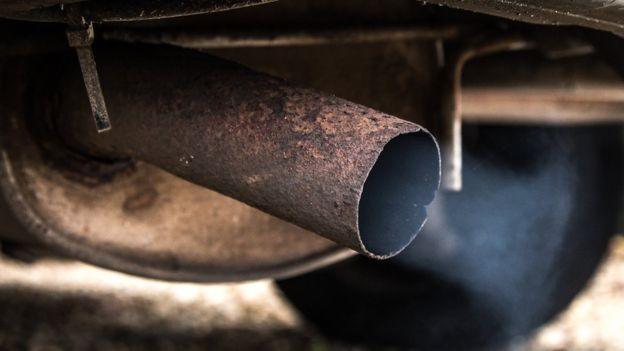Will Birmingham tax diesel cars to cut down pollution?
- Published

Working out how many die from air pollution is not easy
Birmingham has an air pollution problem and people are blaming diesel engines. The council say it's diesel powered vehicles that cause the city to regularly break air pollution limits and it's all having a huge effect on the health of the people who live there.
Assessing those health problems is fairly complex however.
The headline figure is that there are 891 deaths from air pollution in Birmingham every year.
Twice as many people die from smoking but nevertheless that's still a big number of people dying for what is, in theory, totally preventable reasons.
As ever with headlines, though, the actual story is a bit more complex than that. Let's stay with the world of transport to illustrate the point.
Overall it's relatively easy to count up the number of people who are sadly killed in car crashes on our roads and arrive at a total.
But air pollution doesn't kill people like that, instead it chips away at lots of lives right across the city.
So lots of us are losing little parts of our lives and dying prematurely thanks to air pollution.
Mortality statistics 101
What the experts do is add up all those lost days and weeks, arrive at a total and then convert that into the equivalent number of deaths.
That's where the 891 deaths number comes from.
It is a really useful way to compare what's happening in Birmingham to what is happening in Manchester (Manchester doing better than Birmingham by the way) but it doesn't quite mean what the headlines often suggest it does.
Also - fun fact - because Birmingham is a very young city, its residents are more resistant to the problems of air pollution which might make our pollution stats look slightly better overall.
Anyway, that's statistics and air pollution so what are the council going to do to tackle the problem?
So far they've run programmes to swap diesel taxis over to LPG and they are trialling cameras that can track bigger commercial vehicles, perhaps one day using that technology to charge them to enter the city or stop them entering the city at all at certain times.
Charging car owners?
Could the council even charge private diesel cars to enter the city? Well after apparently saying it might consider the idea... the council very definitely says it won't.
There's sympathy for people who bought diesel cars because they believed they were cheaper or even greener and for diesel van owners that are part of the delivery service we expect from so many businesses today.
Right now the council says there's "chaos" in Government about how to tackle this whole problem. The government say they've "committed more than £2 billion" to sorting things out.
Now we all wait until the spring when the council will finish gathering evidence about what is going on and the government make some announcements.
Oh, and don't forget there's no threshold for the health problems caused by emissions from diesel vehicles.
Any level is bad news.
So while Birmingham has it bad... anywhere in the Midlands there are diesel vehicles there's an impact on the health of people who live there.
To finish some quick answers to questions from Twitter followers about all this:

So far the council say there are no plans at all to charge any cars coming into the city centre. But LPG vehicles have much lower emissions, and since the council switching diesel cabs to LPG you should be fine whatever happens.

The problems with the official figures from manufacturers may be one reason pollution seems to be much worse than some expected.

Officially for Birmingham people tend to give the figure of 891 deaths, but as I explained above, it's a bit more complex than that.

Possibly. But so far it's not looking too hopeful.

It's actually easier for the council to tackle buses, lorries and taxis than take on the entire fleet of privately owned diesel cars. The hope is that will be enough on its own to get pollution down below the targets.
Thanks for all your questions!